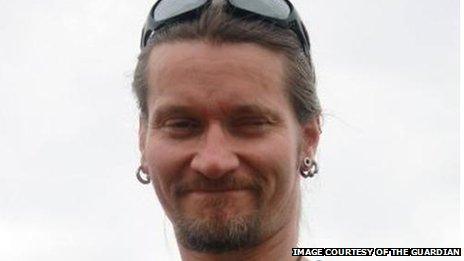Undercover police face sex ban under new code of ethics
- Published

PC Mark Kennedy, alias Mark Stone, had a sexual relationship with an activist
Undercover police are to be banned from having sex with people they are spying on under a new code of ethics, MPs have been told.
College of Policing chief Alex Marshall outlined the draft code to the Home Affairs Select Committee.
The committee has called for a new code of ethics for all officers in England and Wales.
Eight women are suing Scotland Yard over claims they were deceived into relationships with undercover officers.
A number of allegations have been made since 2011, when it emerged that former PC Mark Kennedy had spied on environmental protesters, posing as Mark "Flash" Stone, and had at least one sexual relationship with an activist.
It is claimed that five undercover officers engaged in infiltrating environmental campaign groups between the mid-1980s and 2010 had relationships with the women, lasting from seven months to nine years.
'Sexual deceit'
The draft code of ethics does not explicitly refer to undercover police.
Speaking to Mr Marshall, Walsall North Labour MP David Winnick said female witnesses had said that undercover police agents had started sexual relationships with them, in some cases resulting in the births of children, without any knowledge on their part that the men were police officers.
"And in their view - as one of them described it - it was a form of sexual deceit by the State itself," Mr Winnick said.
"Do we take it from this proposed code that undercover police agents will not enter into such relationships?"
Mr Marshall replied: "They absolutely should not.
"They would be breaching the code if they did and in regard to that particular, the undercover world, since the College of Policing has started we have introduced a new training programme for the person who authorises that kind of undercover work.
"It will be a requirement for the next group of people to become chief officers that they have to pass that course before they can become chief officers.
"We explicitly include in that course that sexual activity while undercover is not allowed."
Breaches of the code will be dealt with through disciplinary procedures including management action and potential gross misconduct hearings.
- Published1 July 2013
- Published1 March 2013
- Published1 March 2013